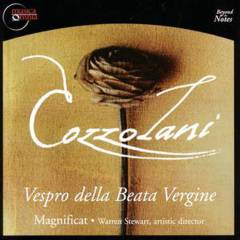Cozzolani - Vespro della Beata Vergine (Magnificat) [2001]
Cozzolani - Vespro della Beata Vergine (Magnificat) [2001]

1.Cozzolani - Deus in adiutorium 02:28 2.Antiphon - Missus Est 00:21 3.Cozzolani - Dixit Dominus 11:41 4.Cozzolani - Concinant linguæ 06:08 5.Antiphon - Ave Maria 00:21 6.Cozzolani - Laudate Pueri Primo 06:58 7.Cozzolani - O quam bonus es 09:30 8.Antiphon - Ne timeas 00:31 9.Cozzolani - Lætatus sum 06:47 10.Cozzolani - Venimus in altitudinem Maris 06:17 11.Antiphon - Dabit ei Dominus 00:19 12.Cozzolani - Nisi Dominus 05:10 13.Cozzolani - O Gloriosa Domina 04:53 14.Capitulum: Isaiah 7:14-15 00:32 15.Responsorium breve: Angelus Domini 01:26 16.Fasolo - Ave maris stella 04:29 17.Antiphon: Gabriel Angelus 00:35 18.Cozzolani - Magnificat Primo 08:55 19.Cozzolani - Quid miseri, quid faciamus 07:02 20.Collecta: Deus, qui de beatae Mariae Virginis utero verbum tuum 01:20 21.Benedicamus Domino 00:20 22.Cozzolani - Surgamus omnes 05:08 23.Fidelium animæ 00:52 Magnificat (Ensemble) Warren Stewart, artistic director Coro Primo Catherine Webster, soprano Margaret Bragle, alto Jennifer Ellis Kampani, tenor (soprano) Jennifer Lane, bass (alto) Karen Clark, bass (alto) Coro Secondo Ruth Escher, soprano Suzanne Jubenville, alto Andrea Fullington, tenor (soprano) Elizabeth Anker, bass (alto) John Dornenburg, violone David Tayler, theorbo Hanneke van Proosdij, organ Warren Stewart, conductor
Recognized during her lifetime as one of the finest composers in Italy, Chiara Margarita Cozzolani spent her entire adult life within the four walls of the musically famous convent of Santa Radegonda in Milan. Contemporary accounts describe the huge crowds that filled the exterior church of the convent to hear the angelic voices of nuns singing Cozzolani's passionate and ecstatic music. On this disc Magnificat has arranged four of Cozzolani's psalm settings, one of her settings of the Magnificat, and six of her motets in the context of Second Vespers for the Feast of Annunciation. These works are also available as part of the two volume complete works of Cozzolani also available for download and purchase on this page. --- music.cozzolani.com
Chiara Margarita Cozzolani was a Milanese nun and the most conspicuous and prolific female composer of sacred music during the seventeenth century. The singing voices of the nuns of Cozzolani's order are spoken of in contemporary documents in the same exalted terms reserved for those who worked under Vivaldi's tutelage at the Ospedale della Pietà about 40 years after Cozzolani's passed into history. As singing leader, primary composer, and sometimes Mother Superior to the order, Cozzolani had a lot to do with their success, and her surviving output, while scant, takes us out of our time and back to the Convent of Santa Radegonda in which she held sway over the best musicians in Milan -- and not a man among them. Cozzolani's music represents some of the most complex and rhythmically vibrant to be found from the 1640s, and that's saying a lot, as Monteverdi was still around for part of that time and the Rossis, Lawes, Cavalli, and Schütz were all at their peak of activity. Cozzolani can be heard to great advantage on Musica Omnia's Chiara Margarita Cozzolani: Vespro della Beata Vergine, featuring the San Francisco-based early music ensemble Magnificat under the direction of Warren Stewart.
Only two of Cozzolani's publications have survived, and these vesper settings are derived from both volumes; this disc is the first in a series in which Stewart and Magnificat hope to record Cozzolani's complete output. All of the pieces are presented with appropriate incipits of chant that relate to the compositions, which range from rolling, highly ornamented pieces for two voices up to dense double choruses of eight voices. The mere sound of the women's voices swelling up into large chords formed from diverse lines of polyphony is in itself exhilarating to listen to, and the vocalists pulling for Cozzolani here are from among some of the best in the early music business -- Catherine Webster, Jennifer Ellis, Ruth Escher, and Andrea Fullington to name a few.
There are many moments in this collection that are as exciting as anything in the works of Hildegard, and far less conjecture in play as to the interpretation of the music. The set includes a useful third disc in which Stewart hits some of the high points in Cozzolani's oeuvre, presented in the manner of an informal radio program rather than a lecture-demonstration, and there is no extra charge for the presence of this disc. It is hard to see how those who already love Monteverdi, or Baroque vocal music of the seventeenth century, will want to resist Musica Omnia's Cozzolani: Vespro della Beata Vergine; however, it may also hold appeal for those whose enthusiasm runs to Hildegard, or to women composers in general. Cozzolani was unquestionably a breed apart from other composers, male or female, of her time or ours. --- Uncle Dave Lewis, Rovi
download (mp3 @320 kbs):
uploaded yandex 4shared mega mediafire zalivalka cloudmailru uplea








